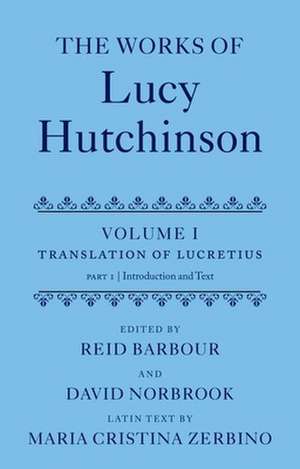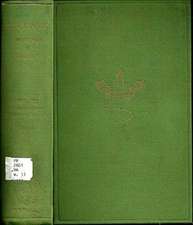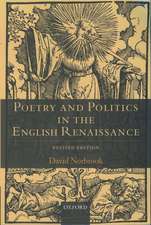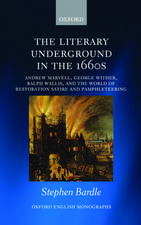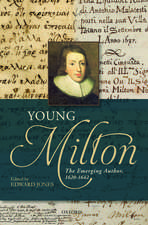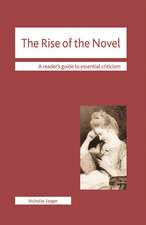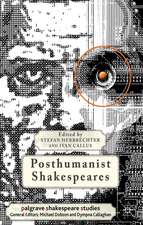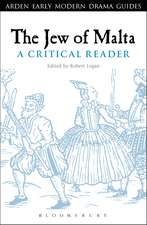The Works of Lucy Hutchinson: Volume I: The Translation of Lucretius: OET: Works of Lucy Hutchinson
Editat de Reid Barbour, David Norbrooken Limba Engleză Quantity pack – 21 dec 2011
Preț: 2392.95 lei
Preț vechi: 3107.73 lei
-23% Nou
Puncte Express: 3589
Preț estimativ în valută:
457.88€ • 479.36$ • 378.87£
457.88€ • 479.36$ • 378.87£
Carte tipărită la comandă
Livrare economică 07-21 aprilie
Preluare comenzi: 021 569.72.76
Specificații
ISBN-13: 9780199247363
ISBN-10: 0199247366
Pagini: 960
Ilustrații: 9 black-and-white halftones
Dimensiuni: 149 x 224 x 80 mm
Greutate: 1.42 kg
Editura: OUP OXFORD
Colecția OUP Oxford
Seria OET: Works of Lucy Hutchinson
Locul publicării:Oxford, United Kingdom
ISBN-10: 0199247366
Pagini: 960
Ilustrații: 9 black-and-white halftones
Dimensiuni: 149 x 224 x 80 mm
Greutate: 1.42 kg
Editura: OUP OXFORD
Colecția OUP Oxford
Seria OET: Works of Lucy Hutchinson
Locul publicării:Oxford, United Kingdom
Recenzii
[an] outstanding edition ... This fine-grained, rigourous edition brings us as near as a modern scholarly edition can to the experience of reading the manuscript of Hutchinson's translation alongside the Latin text of 1631 by Daniel Paraeus which she mainly used ... Painstaking reconstruction of Hutchinson's compositional processes and a detailed engagement with her intellectual world are two of the contributions offered by the excellent, 320-page-long commentary.
a collaborative scholarly achivement to which future students of classical and English literature will be deepy indebted.
provides more than three hundred pages of extensive, detailed, line-by-line commentary, and the volume concludes with a useful bibliography and an intelligent index ... This edition finally makes it possible for readers to estimate the extent of Hutchinsons achievement from a multitude of angles. Even scholars not mainly concerned with Hutchinson or with female authorship will find these notes and commentaries of value.
Barbour and Norbrook have given us in Hutchinsons Lucretius a splendid example of the best new research in many related areas and a magnificent tribute to the enterprise of the author herself. It is a brilliant beginning for Oxfords ambitious project of her complete Works.
As well as serving its primary purpose of assisting readers making their way through Hutchinsons translation, then, this commentary will be of interest to practically anyone concerned ... with the history of Lucretianism. At other points, in engaging with the scholarship of our own times, the commentary has things to say to contemporary Lucretian studies as well.
The substantial, 146-page introduction by N. gives a thorough account of the contexts of Hutchinsons translation ... insightful analysis of Hutchinsons contradictory position in relation to Lucretius a contradiction that Greenblatt noted is highly persuasive ... represents a boon to scholars of Lucretius and his reception, of Hutchinson, of early modern women writers, and of early modern studies more generally.
[The] comprehensive introduction and brilliant line-by-line notes synthesize scholarship from fields as wide-ranging as translation studies and the history of science, not to mention the rich traditions of Lucretian commentary. Hutchinson's impressive rendering of this sublime and difficult poem has been meticulously transcribed from the partially autograph manuscript ... An exemplary start for Oxford's four-volume Works of Lucy Hutchinson ... Essential.
With their incisive introduction and impeccable textual work, Reid Barbour and David Norbrook have produced a deeply impressive edition of Lucy Hutchinsons sometimes labored, sometimes shimmering, always invigorated translation of Lucretius.
a major event not just for the study of the reception of Lucretius in the seventeenth century but for the study of Lucretius more generally, the study of seventeenth-century poetics, the examination of gender, and the related question of female authorship in the early modern period. ... One of the signal advantages of this generous edition is that we are now better placed to understand the stresses of publishing translations of the "naughty" pagan poets during an age of doctrinal purity and zeal. ... His vast poem still contained much that even Puritans could find bracing or exhilarating. Like other early modern readers, Hutchinson was drawn to this crucial element of the heathen heritage like a moth to the flame. The remarkable editors of this splendid edition show us why.
Their long introduction, learned commentary, and notes comprise by far the best resource available for understanding the strange conjunction of radical Protestantism, Epicureanism, and an exceedingly complex, brilliant woman.
a collaborative scholarly achivement to which future students of classical and English literature will be deepy indebted.
provides more than three hundred pages of extensive, detailed, line-by-line commentary, and the volume concludes with a useful bibliography and an intelligent index ... This edition finally makes it possible for readers to estimate the extent of Hutchinsons achievement from a multitude of angles. Even scholars not mainly concerned with Hutchinson or with female authorship will find these notes and commentaries of value.
Barbour and Norbrook have given us in Hutchinsons Lucretius a splendid example of the best new research in many related areas and a magnificent tribute to the enterprise of the author herself. It is a brilliant beginning for Oxfords ambitious project of her complete Works.
As well as serving its primary purpose of assisting readers making their way through Hutchinsons translation, then, this commentary will be of interest to practically anyone concerned ... with the history of Lucretianism. At other points, in engaging with the scholarship of our own times, the commentary has things to say to contemporary Lucretian studies as well.
The substantial, 146-page introduction by N. gives a thorough account of the contexts of Hutchinsons translation ... insightful analysis of Hutchinsons contradictory position in relation to Lucretius a contradiction that Greenblatt noted is highly persuasive ... represents a boon to scholars of Lucretius and his reception, of Hutchinson, of early modern women writers, and of early modern studies more generally.
[The] comprehensive introduction and brilliant line-by-line notes synthesize scholarship from fields as wide-ranging as translation studies and the history of science, not to mention the rich traditions of Lucretian commentary. Hutchinson's impressive rendering of this sublime and difficult poem has been meticulously transcribed from the partially autograph manuscript ... An exemplary start for Oxford's four-volume Works of Lucy Hutchinson ... Essential.
With their incisive introduction and impeccable textual work, Reid Barbour and David Norbrook have produced a deeply impressive edition of Lucy Hutchinsons sometimes labored, sometimes shimmering, always invigorated translation of Lucretius.
a major event not just for the study of the reception of Lucretius in the seventeenth century but for the study of Lucretius more generally, the study of seventeenth-century poetics, the examination of gender, and the related question of female authorship in the early modern period. ... One of the signal advantages of this generous edition is that we are now better placed to understand the stresses of publishing translations of the "naughty" pagan poets during an age of doctrinal purity and zeal. ... His vast poem still contained much that even Puritans could find bracing or exhilarating. Like other early modern readers, Hutchinson was drawn to this crucial element of the heathen heritage like a moth to the flame. The remarkable editors of this splendid edition show us why.
Their long introduction, learned commentary, and notes comprise by far the best resource available for understanding the strange conjunction of radical Protestantism, Epicureanism, and an exceedingly complex, brilliant woman.
Notă biografică
Reid Barbour is Professor of English at the University of North Carolina at Chapel Hill. He has published widely in the field of early modern studies, including books on classical reception, religion, prose fiction, and John Selden. He is the editor of Studies in Philology.David Norbrook has taught at Magdalen College, Oxford and the University of Maryland and is currently Merton Professor of English Literature, University of Oxford. He has published widely on Renaissance literature and history.
